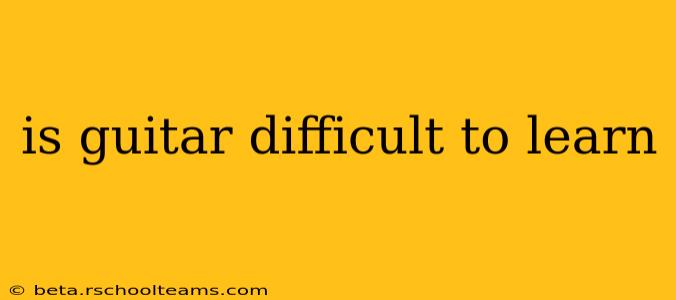Learning guitar, like any instrument, presents a unique set of challenges. The difficulty isn't uniform; it depends on several factors, including your natural aptitude, learning style, dedication, and the specific goals you set for yourself. This guide explores the complexities of learning guitar, addressing common questions and offering a realistic perspective on the journey.
What Makes Learning Guitar Difficult?
Several aspects of guitar playing contribute to its perceived difficulty. These include:
-
Physical Coordination: Playing guitar requires coordinating both hands independently. Your fretting hand must accurately press down strings, while your picking/strumming hand must produce clear, rhythmic notes. This coordination takes time and practice to develop.
-
Finger Strength and Dexterity: Initially, your fingers might feel weak and sore. Building finger strength and dexterity is crucial for playing chords, scales, and complex techniques. This requires consistent practice and patience.
-
Developing Muscle Memory: Guitar playing is largely about muscle memory. Repeating exercises and practicing songs helps build this memory, allowing you to play smoothly and fluently. This is a gradual process requiring persistence.
-
Understanding Music Theory: While not strictly necessary to begin playing, understanding basic music theory—scales, chords, rhythms—significantly enhances your progress and allows you to play more creatively and intuitively.
-
Overcoming Frustration: Learning any instrument involves moments of frustration. Mastering challenging techniques or overcoming plateaus requires resilience and a willingness to persevere through setbacks.
How Difficult Is It Compared to Other Instruments?
Compared to other instruments, the guitar sits somewhere in the middle in terms of difficulty. It's arguably easier to learn the basics of than, say, the piano or violin, which require more complex finger coordination from the start. However, mastering advanced techniques on the guitar, like fast fingerpicking or complex soloing, can be just as challenging as mastering any other instrument. Ultimately, the perceived difficulty is subjective and depends on individual aptitude and dedication.
What are the Easiest Things to Learn on Guitar?
Starting with simple chords like G, C, and D is a great way to build a foundational understanding. Simple strumming patterns and basic fingerpicking exercises are also easy to learn and provide quick gratification. Focusing on these early on builds confidence and motivates continued learning.
How Long Does It Take to Learn Guitar?
There's no definitive answer to this question. Some individuals might learn basic chords and strumming patterns within weeks, while others might take months or even years to achieve the same level of proficiency. The time investment depends on your practice consistency, learning style, and desired level of mastery. Regular, focused practice is key to accelerating your progress.
Is it Hard to Learn Guitar Without a Teacher?
Learning guitar without a teacher is possible, but it presents certain challenges. Self-taught guitarists might develop bad habits or struggle to correct mistakes independently. A teacher provides structured learning, personalized feedback, and guidance, accelerating progress and preventing the development of flawed techniques. However, many resources exist online (videos, apps, websites) to support self-learning.
Can I Learn Guitar If I'm Not Musical?
Musical talent is not a prerequisite for learning guitar. While some individuals may possess a natural aptitude for music, dedication and consistent practice can compensate for a lack of innate musicality. The key is to remain persistent and focus on gradual progress.
What's the Best Age to Start Learning Guitar?
There's no ideal age to start learning guitar. Children may benefit from early exposure to music and develop exceptional coordination and dexterity, while adults can often bring more focus and discipline to their practice. The most important factor is enthusiasm and a genuine desire to learn.
Learning guitar is a rewarding journey, but it demands patience, dedication, and consistent practice. The perceived difficulty is subjective, but with the right approach and mindset, anyone can learn to play.
